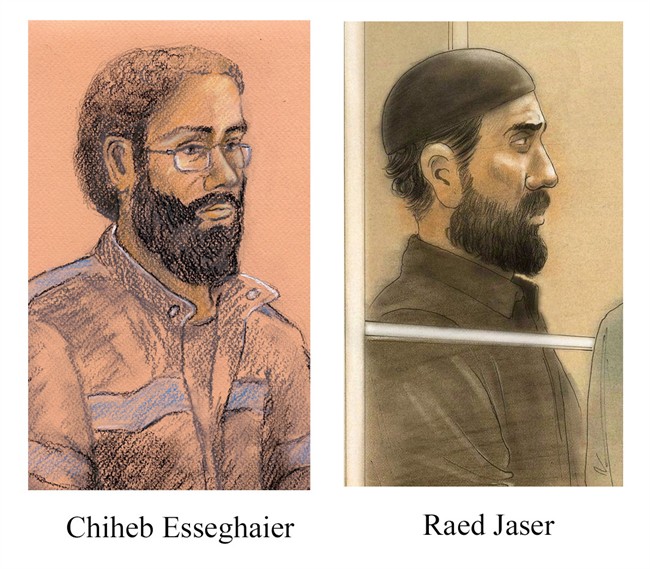TORONTO – Day eight of deliberations in the Via Rail terror trial began with a lesson on intent.

In a two-page note to the judge submitted Tuesday, the jury asked for clarification whether it was enough to just talk about their plot or if they had to have the intention to carry it out.
“Whether an intention to explore, research or initiate the ‘train plot’ is sufficient to satisfy this element or whether an intention to carry the ‘train plot’ to fruition is required.”
It is an important and significant question for the jury in reaching their verdict in the case against Chiheb Esseghaier and Raed Jasser because they must decide whether the two men worked together to hatch a deadly plan to derail a Via Rail train travelling from New York and Toronto and whether they intended to put that plan into effect.
READ MORE: Via Rail terror suspect tried to deradicalize co-accused: court document
After taking the night to come up with an answer, court resumed Wednesday morning and in a four page response to the jury Justice Michael Code said the element of intention relates to the agreement.
“I instruct you as a matter of law that a conspiracy comes into existence when two parties agree to commit a specific crime (in this case, the derailment of a passenger train) and at that very moment of agreement they genuinely intend to put the agreement into effect. Nothing more is required,” said Justice Code.
Both men have pleaded not guilty to numerous terror-related charges. Jaser’s lawyers maintain their client wasn’t an extremist but rather a con artist playing a role, driven by money.
Esseghaier chose to represent himself but did not participate in the trial because he says he only follows the laws of the Qur’an.
Since deliberations began last Wednesday the jury has come back four times with questions for the judge. Reporters have been sitting outside of the courtroom waiting for updates and cameras are set up outside ready for a verdict.
READ MORE: What we know about an unidentified FBI agent who testified at Via Rail trial
Still it is impossible to know where the jury is in their deliberations and whether they are close to reaching a decision. It’s not clear whether the holdup is related to the hundreds of pages of documents and hours of wire tap conversations and surveillance video that they must review.
In re-instructing the jury this morning Justice Code emphasized what the jury must weigh in reaching their decision.
“A person cannot be a conspirator if he or she merely pretends to agree…A conspiracy requires an actual intention in both parties at the moment of exchanging the words of agreement to participate in the act proposed,” Justice Code said.




Comments